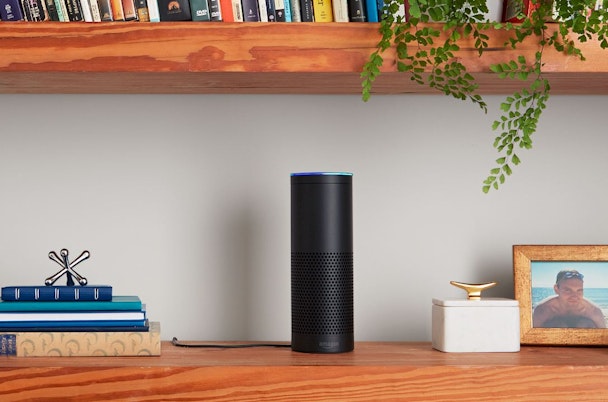A day in the life of a real-life Alexa
Alexa, can you get back to me by the end of the day with a revised press release announcing our new network hires?

Credit: Amazon
Alexa, what’s the best way to generate campaign buzz socially?
Alexa, why are so many millennials choosing tech jobs over jobs in advertising?
SHE can’t deliver what you want, but I can. The Alexa who is the voice of Amazon’s Echo doesn’t know how to answer many questions my bosses ask me daily, but so many are singing her praises. As an Alexa, it’s kind of infuriating.
I guess it could be considered kind of cool to continually see my name in headlines. When I was younger, I dreamed about being an actress and seeing my name in bright lights. My dreams have sort of become a reality as I see my name in the news every day. Reporters and consumers alike marvel at all Alexa can do, from being the perfect companion to creating perfect playlists. The digital assistant who lives inside Amazon’s smart speakers is taking kitchens by storm. She’s the sound of screenless computing. You can ask her about the weather, movie show times, or measurement conversions. She’ll update your shopping lists or purchase a movie for you on Amazon. (I have heard, however, that she doesn’t know who Thomas Jefferson is. I do, not that I’m competitive or anything.)
It’s funny. People are increasingly talking to me like I’m my all-knowing namesake. They playfully ask me mundane questions in an overly articulate voice to ensure the ask registers and I can provide a response. More annoying is when I hear my name called at work and innately respond, only to realize a co-worker is talking to her.
Ouch. I already feel out of my depth as a 22-year-old working at my first job in an industry filled with some of the most creative and shrewdly strategic minds in the world. Now, I have the additional weight of knowing some might not think I’m the smartest Alexa in the room.
Many of my peers are insecure about our intelligent software counterparts. Maybe it’s because Hollywood has a penchant for stories about robots gone bad, but there is definitely a widespread fear among my friends that intelligent software will make us humans obsolete. They know more, are more capable, and have no emotional barriers – the trifecta of an evil overlord, right?
Rationally, I know that Alexa doesn’t actually know more than I do. She can simply retrieve information faster than I can. She may be able to add all the ingredients for my mom’s homemade marinara sauce to my shopping list, but she doesn’t know at what simmering point the contents will begin to taste just right. As far as having no emotional barriers, yeah – she’s got me beat. Dry eyes are not my strong suit.
Right now, artificial intelligence isn’t truly intelligent. It may be at some point in the future, but for now, it needs us to provide context to its computing. Really, I don’t need to fear the other Alexa. I know that smart machines aren’t trying to compete with humans – they’re only trying to make us and our lives better. I guess my generation just doesn’t like to feel like something or somebody else knows more than we do. Even people with decades more of experience than we have. My peers tend to register an Alexa-like know it all like they do constructive criticism: as an insult to their intelligence.
Many of us newbies just starting out in our respective industries think we’re supposed to have a thorough grasp of domestic and foreign affairs, history, the economy, technology, modern art, philosophy, and know the difference between an ale and a lager. But more than that, we think we’re supposed to have an exhaustive knowledge of our specific field. This type of thinking is dangerous and unproductive. But I don’t think it’s necessarily a product of millennial entitlement or arrogance or whatever new sweeping generalization is thrown at us this week. I think it’s probably the result of run-of-the-mill fear, fear that we’re not good enough and someone will imminently find out.
Whether named Alexa or not, we’ve all experienced imposter syndrome in one way or another. Insecurity happens in team meetings, business pitches, interviews, even during office happy hours. Even though we know we prepared and have been told we are doing well by our bosses, we can’t always mute the voice inside that makes us doubt. Thus, when a superior tells you your idea won’t work or something you’ve done could be better, it triggers that discomfort and puts you on the defensive. It takes time but ultimately you learn that there’s always room for improvement. And, while you have things to learn, there are things you know that you can teach in the process. It’s not all or nothing. We should strive to listen to people who know more than we do without discounting our own capabilities and strengths. After all, being wrong and being talented are not mutually exclusive.
I guess that Alexa can teach this Alexa after all. I don’t have to outsmart her or take pleasure when she flubs the answers to a question. There’s going to be times she makes me and all of us a little better. At the least, a little faster. I suppose I’ll just have to polish my one-liners for the next time someone asks me a question as if talking to her.
Alexa Abdalla is a PR associate at Project Worldwide. She tweets @lex_abdalla

